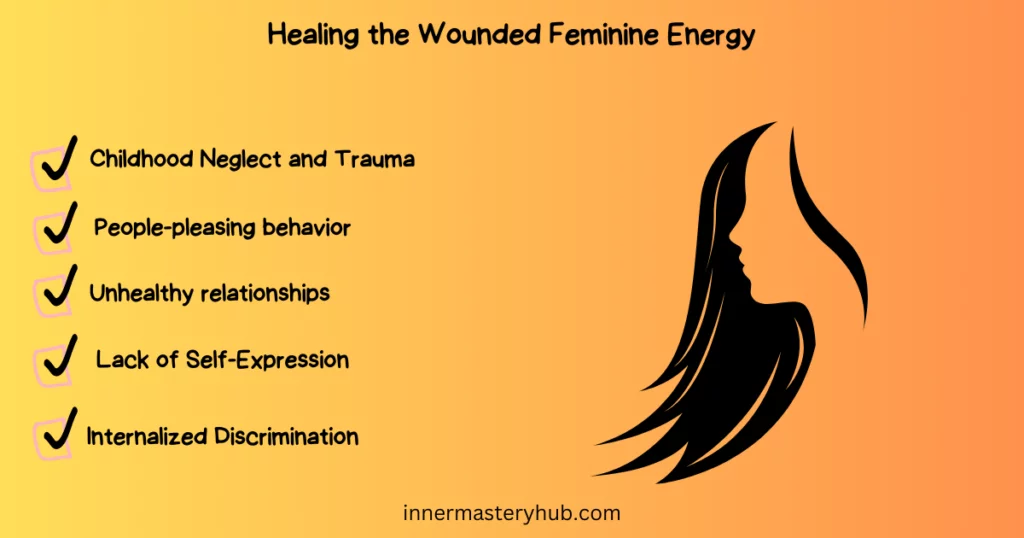
Love should be a rollercoaster, but not a crash course in heartbreak. Sadly, some men come equipped with their own set of danger signals disguised as charm or charisma. Before you find yourself nosediving into a toxic relationship, it’s time to brush up on your emotional radar. Buckle up, ladies, because we’re about to dissect the giant red flags in men you cannot ignore in men.
RELATED: The Introverted Alpha Male
Table of Contents
Top 13 Red Flags in Men to Look For
13 red flags in men to look for in a new relationship:
1. They degrade you
An unsuitable partner can slowly damage your self-esteem and mental health. Constant criticism targets your perceived weaknesses and shortcomings, making you feel inadequate. The feeling of being undervalued and unloved arises when they ignore your achievements.
Guilt-tripping and mind games can cause self-doubt and reality distortion. Withheld affection and emotional support leave you lonely and open to rejection. Your partner discourages or stops you from spending time with supportive people, which worsens the trauma.
Gaslighting further corrupts your self-image, making you doubt your sanity and judgment. Disregarding your feelings and neglecting your contributions erode your confidence and leave you feeling emotionally exhausted and underappreciated.
You should feel supported, appreciated, and valued in a healthy relationship, so understanding these warning signals is vital to your well-being.
2. Overly dominating behaviour
Dominant behavior in a relationship suffocates personal autonomy and creates a power imbalance. A partner like this wants to dominate your life, from essential and tiny decisions to social interactions and daily activities. This dominating presence typically causes a constant feeling of being confined and powerless.
Your opinions and desires may be ignored, reducing your agency. Your views and feelings are ignored in one-sided communication. This excessive control can isolate you from friends and family, increasing dominance and making it hard to establish a support system outside the partnership.
The constant pressure to comply with the dominating partner can cause anxiety, resentment, and self-esteem loss. Recognition and correction of such conduct are essential for maintaining a healthy relationship and allowing both partners to develop individually and together. A healthy relationship compromises and accepts differences. No one controls another’s activities.
RELATED: Healing the Wounded Feminine
3. Lack of trust
In a relationship, a lack of trust may kill the spark, one of the significant red flags in men. It steadily robs the joy out of what ought to be a satisfying relationship by casting a shadow of uncertainty, distrust, and insecurity. However, why is there such a lack of trust, and how does it show up?
Let’s study how mistrust can ruin your love life by delving into its dark waters. Broken promises and cruel deeds can create lasting wounds, whether in the current relationship or previous ones, and make it challenging to build new partnerships.
These fears, which cause your partner to question you constantly and behave in a controlling manner, may be the result of low self-esteem or painful memories. When there is a lack of honest and open communication, distrust grows in the background. Unseen emotions, evasive responses, and a lack of transparency create doubt.
RELATED: Leaning Back: 7 Feminine Principles for a Balanced Workplace
4. Emotional or mental abuse
Not all abuse results in a shattered bone or black eye. It can also be found subtly, such as whispers, unjust actions, and the gradual deterioration of your self-esteem in an abusive relationship. Today, we raise awareness of the sometimes invisible wounds caused by major red flags in men, emotional and psychological, allowing you to spot warning signs and put your safety first. Remember, emotional abuse can cause PTSD. Some common red flags in men are the following:
Red flag: He uses guilt, obligation, or fear to control your behavior or get what he wants.
How it makes you feel: You feel like you’re constantly responsible for his happiness and well-being, neglecting your needs. You might question your sanity or reality due to his gaslighting tactics.
Words have the power to hurt: Your self-worth and confidence are undermined by taunts, humiliations, and unceasing criticism. You have the impression that you’re always attempting to contain your emotions to prevent having another emotional breakdown.
The weapon of isolation: Your partner keeps you apart from your loved ones and support networks by controlling who you see and what you do. You experience isolation and entrapment.
Gaslighting distorted reality: you are tricked into doubting your senses, and recollections signify a huge red flag in relationships. Your abuser minimizes or rejects your experiences, which leaves you perplexed and self-doubting.
Fear replaces trust: A culture of fear is fostered by threats, intimidation, and subtly manipulative tactics. You can’t communicate how you feel and feel unsafe.
Never forget that you are deserving of respect and love. Any abuse is never tolerated. Let not the invisible scars dim your light. Seek assistance, regain control of your life, and set out on the path to recovery,
RELATED: Unearthing the Source: The Root of Suffering Revealed
5. Narcissism
Narcissists have the incredible hobby to take you entirely by surprise. They entice you with grand gestures and promises of an exciting future, and their exaggerated love bombing translates into confidence and charisma. Their seemingly larger-than-life persona captivates you, and their obsessive focus flatters you.
The following are some clear relationship red flags in men that your partner’s good looks could be masking a darker side:
An inflated feeling of self-importance: Their demands and accomplishments are the center of attention. Every discussion finally returns to its magnificence.
A lack of empathy: They cannot fully comprehend or recognize your needs or feelings. Your happiness is only acknowledged when it makes them seem reasonable, and your suffering is downplayed or ignored.
A desire for appreciation: Their entire behavior is motivated by their ravenous need for praise and approval from others. You become an extension of their persona, required to stroke their ego continuously.
Manipulation and shifting of blame: They always claim responsibility for failures that don’t go their way. They are experts at shifting the blame and gaslighting you into doubting your reality and views.
You deserve a respectful, empathetic, and loving relationship. Leave this type of person immediately for your sanity. Don’t let this ex-narcissist’s glitter distract you from your worth. You can escape the quicksand and find true love.
6. Codependency
Codependency isn’t just about being clingy or needy. It’s a complex pattern of behavior rooted in a deep-seated fear of abandonment and an overwhelming focus on fulfilling the needs of others, often at the expense of one’s well-being.
Losing Yourself in the Relationship: Codependent People frequently use their relationships to define who they are. Their ability to satisfy, mend, or save their spouse determines how valuable they feel about themselves.
The Need to Be Needed: Codependents frequently experience a need to prioritize the pleasure and well-being of others over their own needs and wants.
Boundaries Become Blurred: Retaining individuality and harmony in relationships depends on having healthy boundaries. But codependent people frequently find it challenging to establish and maintain boundaries, which can result in unhealthful entanglement patterns.
To unlearn this pattern, you must build your self-esteem and create boundaries. Therapy can help you understand the roots of codependency, develop healthy coping mechanisms, and learn to establish healthy boundaries.
RELATED: Understanding Codependency vs. Interdependency
7. Lack of conflict resolution
Good relationships aren’t perfect, conflict-free environments. Arguments and tense times will inevitably arise, but how we handle them will determine how strong and long our relationship is. But neglecting dispute resolution can have far-reaching effects, including a trail of hatred, emotional detachment, and a sense of alienation.
Poor communication, where concerns are not voiced or ignored, typically leads to ineffective dispute resolution. Trust and intimacy may break down over time. Unresolved confrontations may return in future disagreements, creating a cycle.
Open communication, active listening, and collaborative problem-solving are essential for healthy partnerships. This lack of conflict resolution must be addressed to maintain a robust and resilient relationship and help both partners grow.
8. Harming your relationships with family and friends
Family and friends create a crucial sense of community for many of us. This is a significant warning flag if someone negatively hurts your relationship with individuals you care about. Healthy partnerships should never jeopardize other healthy connections.
9. Lack of open communication
A guy or girl’s unwillingness to communicate openly can be red flags in men. Communication is not accessible to everyone. Individuals may be discouraged from speaking up due to feelings of confrontation, vulnerability, or loss of control. However, this could be a warning flag if your partner is unwilling to talk.
10. Inadequate social connections or friends
Everyone does not have a large group of pals. Some people have a more difficult time connecting with others. They may be experiencing social anxiety or shyness. However, not having friends or close ties can be a red indicator in a guy or a lady.
RELATED: Becoming Socially Adept in Today’s World
11. Commitment-Phobe
You know, the man who is allergic to anything long-term. This person can avoid labels like “boyfriend” and disappear when you discuss a future event you’d want to attend together.
He sometimes talks about “living in the moment” or “keeping things spontaneous,” but he’s not in it for long. Warning: emotional investment may produce no return.
He says, “Let’s just see where things go, no need to label it.”
He Means: “I’m not committed to this relationship, so don’t get too attached.”
RELATED: 9 Powerful Steps to Achieve Profound Transformation During a Soul-Crushing Life Crisis
12, Horse of the Spotlight
This boy craves attention so fiercely that he could outperform Broadway divas. It’s always about him, from Instagram pictures to interrupting talks to trumpet his praises.
He’s Saying: “Again, I had the craziest day; you wouldn’t believe what happened to me.”
He Means: “It’s always been about me, and it always will be.”
13. Double Standards
He holds you to the highest of standards while failing to meet even the most basic of his own. It’s a problem if you’re five minutes late. But what if he makes you wait? It would be best if you were honored that he even turned up.
“You’re late,” he says. You realize how crucial time management is?”
What He Means: “Rules are for you, not for me.”
RELATED: 7 Secrets to a Polished Personality
How do you deal with red flags in men in a relationship?
Recognizing red flags in men can be challenging, particularly when emotions are involved. However, you must confront them constructively to safeguard your well-being and create good relationships. When understanding red flags in men, you might take the following steps:
1. Recognize and Trust Your Gut
Don’t reject your emotions or brush aside nagging thoughts. If something doesn’t feel right, it probably is. Pay attention to your intuition and recognize red flags in men as potential warning indications.
2. Collect Evidence
Don’t make assumptions based on single events. Observe the behavior pattern over time and gather concrete examples of the red flags in men you’ve found. This can assist you in determining whether the problem is reoccurring or a one-time occurrence.
3. Communicate honestly and openly
Discuss your worries with your partner calmly and courteously. Select a neutral time and place, and concentrate on communicating your feelings and needs without judgment or blame. Actively listen to their point of view and try to comprehend their intentions.
4. Establish Boundaries and Limits
Once you’ve discovered the red flags in men, explicitly define your boundaries. Inform your partner of the inappropriate behaviors and the repercussions of their actions if they continue. Be tough but fair, and don’t be afraid to leave if they don’t respect your boundaries.
5. Seek Help
Discuss your worries with a trusted friend, family member, or therapist. Getting a second opinion can help you achieve clarity and affirm your emotions. Seek expert help from a couples therapist, especially if communication appears impossible or the red flags in men are extreme.
6. Put Your Health First
Remember, your health comes first. Don’t be afraid to end a relationship that is causing you emotional pain, controlling behavior, manipulative behavior, or endangering your safety in romantic relationships. It is acceptable to choose oneself and seek happiness in healthier relationships.
Concentrate on the facts. Don’t let your emotions influence your decision-making. Avoid broad generalizations by using particular examples. Be prepared to face opposition. Your partner may become defensive or try to minimize the problem. Maintain a calm and firm tone throughout your discussion without ignoring red flags in men.
Allow yourself plenty of time in the early stages of a relationship. Make no hasty decisions, especially if you’re emotionally charged. Allow yourself time to process your emotions and thoughts.
INNER MASTERY HUB MESSAGE
Remember that you have choices to select and build a foundation for a relationship. You are not obligated to stay in a relationship that does not suit your needs, personal growth, self-improvement or depresses you. Then it’s better to break up. Healthy and rewarding relationships are waiting for you.
Addressing red flags in men might be difficult, but it is a necessary step towards developing healthy and fulfilling partnerships. Trust your instincts, communicate properly, and put your health first. Remember that you have the right to be happy and loved in a way that respects your limits and ideals.
FAQS
Can you list common signs of a toxic relationship with a man?
Lack of respect, constant criticism, controlling behavior, trouble communicating, attempts to isolate, lack of trust, unhealthy jealousy, emotional and physical abuse, constant drama, unequal power dynamics, ignoring needs, blaming others, stonewalling, and not being able to say sorry are all signs of a bad relationship with a man. To make your relationship healthy, you need to be able to spot these signs.
Are there specific behaviors that indicate emotional manipulation in men?
Men who do these things are emotionally manipulating you: making you feel guilty, gaslighting you, playing the victim, giving you the silent treatment, being inconsistent with your words and actions, taking advantage of your weaknesses, criticizing you all the time, and using snark to hurt you. You must be aware of these manipulative behaviors to stay emotionally healthy in relationships.
What are the warning signs of a controlling man in a relationship?
Too much jealousy, cutting you off from family and friends, telling you what to do, watching what you do, pressuring or manipulating you to make decisions, getting very angry quickly, and not respecting your limits are all signs of a controlling man in a relationship. To keep your relationship healthy, you need to be able to spot these signs.
Can you provide a checklist for red flags in men?
Red flags in men can include inconsistent behavior, bad communication, controlling tendencies, disrespect, dishonesty, refusal to compromise, attempts to isolate, too much jealousy, aggression, lack of accountability, disregard for feelings, anger management problems, self-centeredness, lack of empathy, unreliability, financial irresponsibility, negative influence, refusal to apologize, patterns of cheating, and resistance to personal growth. When you look at these signs, trust your gut.
Are there differences in red flags between casual dating and serious relationships?
There may be different red flags in men for dating and being in a serious relationship. In casual dating, red flags could be unclear communication, not being honest, or acting in a way that doesn’t show commitment. In serious relationships, red flags in men could include controlling behavior, not respecting limits, or emotional manipulation that happens over and over again.
What are indicators of a man not being ready for commitment?
Men who don’t want to talk about their plans for the future, avoid defining the relationship, don’t want to meet family or friends, and keep much of their freedom may not be ready to commit. Not being emotionally available, not wanting to make long-term promises, or focusing on short-term goals can also be signs that someone is not ready to commit.
How to identify red flags in a man’s behavior through text messages?
To spot red flags in a man’s behavior through text messages, look for patterns of disrespect, too much power, or rude communication. Watch for constant negativity, not responding, and not wanting to have deep talks. Trust your gut; if something feels awkward or manipulative, you might want to talk about it with someone or ask your friends for help.
What behaviors suggest a lack of emotional availability in men?
Men may show they aren’t emotionally available by avoiding deep chats, keeping emotional distance, and being hesitant to talk about their feelings. Limited emotional availability can also be shown by having trouble showing empathy or shutting down mentally when things get tough. Communication that isn’t consistent and avoiding commitment may also be signs of mental unavailability.
What are the signs of a man with anger management issues?
Men with trouble controlling their anger may have frequent outbursts, violent responses to small things, trouble keeping their temper in check, and a tendency to blame others. Anger control problems can also be seen in people who are constantly irritable, hostile, and unwilling to get help or take responsibility for their actions.
How to navigate red flags when trying online dating with men?
When online dating with guys, watch out for red flags like behavior that isn’t consistent, refusals to share personal information, and communication that is too hostile. Trust your gut, look into possible matches, and put safety first. Set clear limits, talk to each other honestly, and think about meeting in public places at first. Let the site know about any behavior that worries you.
Can therapy help address and resolve red flags in men in a relationship?
Yes, therapy can be very helpful for talking about and fixing red flags in guys in a relationship. Therapists give people a safe place to talk, help them see when they’re stuck in unhealthy habits, and give them tools for personal growth. Couples therapy can help people understand each other better and make good changes that lead to healthier relationships.
What are some red flags in men when dating?
Controlling behavior, dismissive attitudes, frequent mood swings, a history of unhealthy relationships, a lack of communication, and a reluctance to introduce you to friends or family are all red flags in men while dating through a dating app. Inconsistencies, disrespectful behavior, and any indicators of manipulation or disregard for your limits should all be noted.






